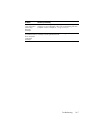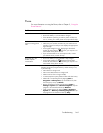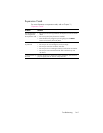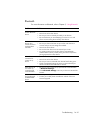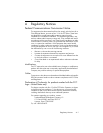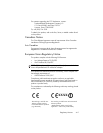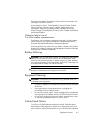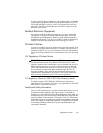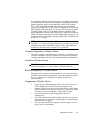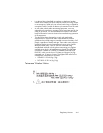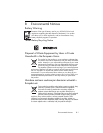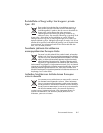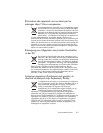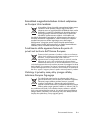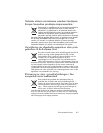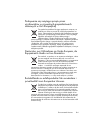
Regulatory Notices A–5
This equipment under test has been shown to be capable of compliance
for localized Specific Absorption Rate (SAR) for uncontrolled environment/
general population exposure limits specified in ANSI/IEEE Standard
C95.1-1992 and had been tested in accordance with measurement
procedures specified in FCC/OET Bulletin 65 Supplement C (2001) and
IEEE Standard 1528-200X (Draft 6.5, January 2002). Ministry of Health
(Canada), Safety Code 6. The standards include a substantial safety
margin designed to assure the safety of all persons, regardless of age and
health. The exposure standard for wireless mobile phones employs a unit
of measure known as the Specific Absorption Rate (SAR). The SAR limit set
by the FCC is 1.6W/kg.
NOTE: In the U.S. and Canada, the SAR limit for mobile phones used by
the public is 1.6 watts/kg (W/kg) averaged over one gram of tissue. The
standard incorporates a substantial margin of safety to give additional
protection to the public and to account for any variations.
Canadian Regulatory Wireless Notice
Operation is subject to the following two conditions: (1) this device may
not cause interference, and (2) this device must accept any interference,
including interference that may cause undesired operation of the device.
Australian Wireless Notice
WARNING! Switch off this device whenever in an area with a potentially
explosive atmosphere (i.e., service stations, chemical plants, etc.).
Brazilian Regulatory Wireless Notice
Este equipamento opera em caráter secundário, isto é, não tem direito a
proteção contra interferência prejudicial, mesmo de estações do mesmo
tipo, e não pode causar interferência a sistemas operando em
caráter primário.
Singaporean Wireless Notice
• Switch off your cellular telephone when in an aircraft. The use of
cellular telephones in an aircraft may be dangerous to the
operation of the aircraft, disrupt the cellular network, and is illegal.
Failure to observe this instruction may lead to suspension or denial
of cellular services to the offender, or legal action or both.
• Users are advised not to use the equipment when at a
refueling point.
• Users are reminded of the need to observe restrictions on the use of
radio equipment in fuel depots, chemical plants or where blasting
operations are in progress.
• The use of the Alert device to operate a vehicle’s lights or horn on
public roads is not permitted.



